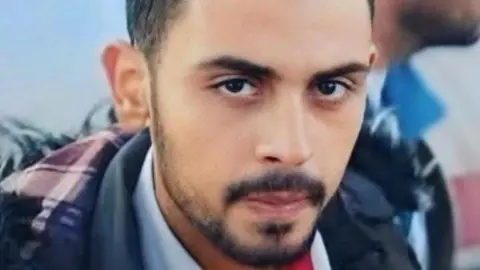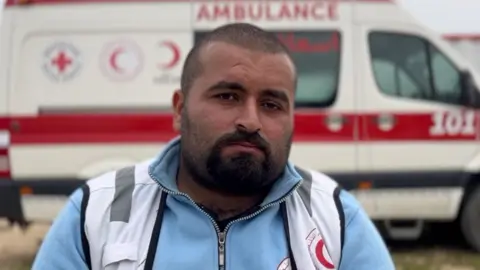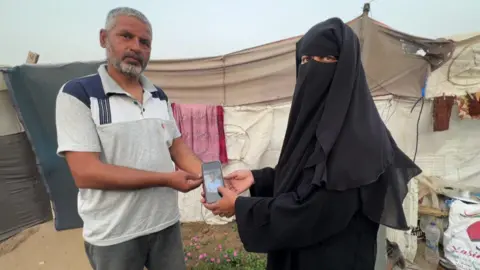'We collected his body instead of celebrating Eid,' says mother of Gaza medic killed by Israel
 BBC
BBC"My heart and soul died when Rifaat was killed," says Hajjah Umm Mohammed, the mother of a Palestinian paramedic who was one of 15 emergency workers killed by Israeli troops in southern Gaza last month.
Rifaat Radwan, 23, was travelling in a Palestinian Red Crescent Society (PRCS) ambulance in a convoy of emergency vehicles when it came under fire on the outskirts of Rafah on 23 March.
"I never expected him to be killed, especially since the area was classified as 'green', meaning safe and open to ambulances," she adds.
The Israeli military initially claimed the troops opened fire because the convoy approached them "suspiciously" in darkness without headlights or flashing emergency lights.
However, video filmed by Rifaat and found on his phone after his body was recovered, showed the vehicles' lights were on as they answered a call to help wounded people.
"Forgive me, mother... this is the path I chose to help people," Rifaat can be heard saying in the video shortly before he was killed, amid the sound of heavy gunfire.
Umm Mohammed believes he was asking for her forgiveness because he knew she would never see him again.
"I entrusted Rifaat to God every time he went out to work," she says. "He was brave, travelling across Gaza from north to south."
Rifaat began volunteering with the PRCS after Israel launched a military campaign in Gaza following Hamas's unprecedented cross-border attack on 7 October 2023.
Umm Mohammed says her son enjoyed humanitarian work.
"He even transported the wounded to cross into Egypt for treatment through the Rafah crossing."
Umm Mohammed explains that on the day he died, Rifaat had gone out with an ambulance after reports of several killed in an Israeli air strike.
"I didn't know he would be one of them [too]," she says.
It was a week before his body and those of his colleagues were found buried in a shallow grave on 30 March.
"Instead of celebrating Eid al-Fitr with Rifaat, we went with the Red Cross to collect his body from Nasser hospital in Khan Younis to bury him," she recalls.
"It was badly decomposed and they wouldn't allow me to see it."
Umm Mohammed says he was an "absolutely beautiful" human being and the sole supporter of her and his father after all his siblings got married.
Following the discovery of the video footage, an Israeli military official changed its initial account that claimed the vehicles approached without their lights on. The official said the person who gave the account was "mistaken".
The official also said the troops perceived the emergency workers as a threat because of an earlier encounter in the area, and that at least six of those killed were Hamas operatives, without providing any evidence.
The troops buried the bodies, including Rifaat's, in sand to protect them from wild animals, the official said.
They were not uncovered until a week after the incident because international agencies, including the UN, could not organise safe passage to the area or locate the spot.
When the UN-led team found the bodies they also discovered Rifaat's mobile phone containing footage of the incident.
The Israel Defense Forces (IDF) has promised a "thorough examination" of the incident, saying it would "understand the sequence of events and the handling of the situation".
The PRCS has alleged that the emergency workers were targeted in a "series of deliberate attacks" which constituted a "full-fledged war crime", and demanded an independent international investigation.
"We need justice for the victims. We need to ensure that all of those who are responsible are held to account. Without this, the crimes will continue to happen," PRCS spokeswoman Nebal Farsakh said on Wednesday.
"I have already lost 27 PRCS colleagues. All of them were killed while doing their humanitarian work. All of them were killed while wearing the Red Crescent emblem. This is not acceptable. It should never, ever have happened. We are not targets. And international humanitarian law is clear – humanitarians, medical personnel should be respected and protected."

Munther Abed, a paramedic who survived the incident, says he and his colleagues were fired at without warning.
"I dropped to the floor in the back of the vehicle and didn't hear any sound from my colleagues except their death gasps," he told the BBC last week.
"Then, Israeli special forces arrested me, pinning my head to the ground so I couldn't see what happened to my team."
Holding back tears, Munther added: "When I found out they were all martyred, it crushed me. They were my second family... my brothers, my friends, my loved ones.
"I wished I had died from the horror of what I saw."
He says his phone was confiscated when he was detained.
"They interrogated me for 15 hours with beatings, insults, and both physical and verbal torture," he adds.
The BBC has put his claims to the IDF, but it is yet to respond.
The PRCS said the area the emergency workers were in had not been classified by the Israeli military as a "red zone", which meant no prior co-ordination was required to access the site, and that the video showed that Israeli military vehicles had not been visible in the area.
It said preliminary forensic reports showed that the paramedics were killed by "multiple gunshot wounds to the upper parts of the bodies", which it described as "further evidence of deliberate killing".
It also dismissed the IDF's internal inquiry and rejected the IDF's accusation that Hamas operatives were among those killed.
 AFP
AFPThe IDF said in a statement on Monday that its Chief of Staff, Lt Gen Eyal Zamir, had been presented with the findings of the initial inquiry into the incident and instructed that it be "pursued in greater depth and completed in the coming days by the general staff investigation mechanism".
"All the claims raised regarding the incident will be examined through the mechanism and presented in a detailed and thorough manner for a decision on how to handle the event," it added.
About 1,200 people were killed and 251 were taken hostage in the Hamas attack on Israel on 7 October 2023.
More than 50,750 people have been killed in Gaza since then, according to the territory's Hamas-run health ministry.
A ceasefire deal announced in January collapsed in March and there are currently 59 hostages still held in Gaza, 24 of whom are believed to be still alive.
